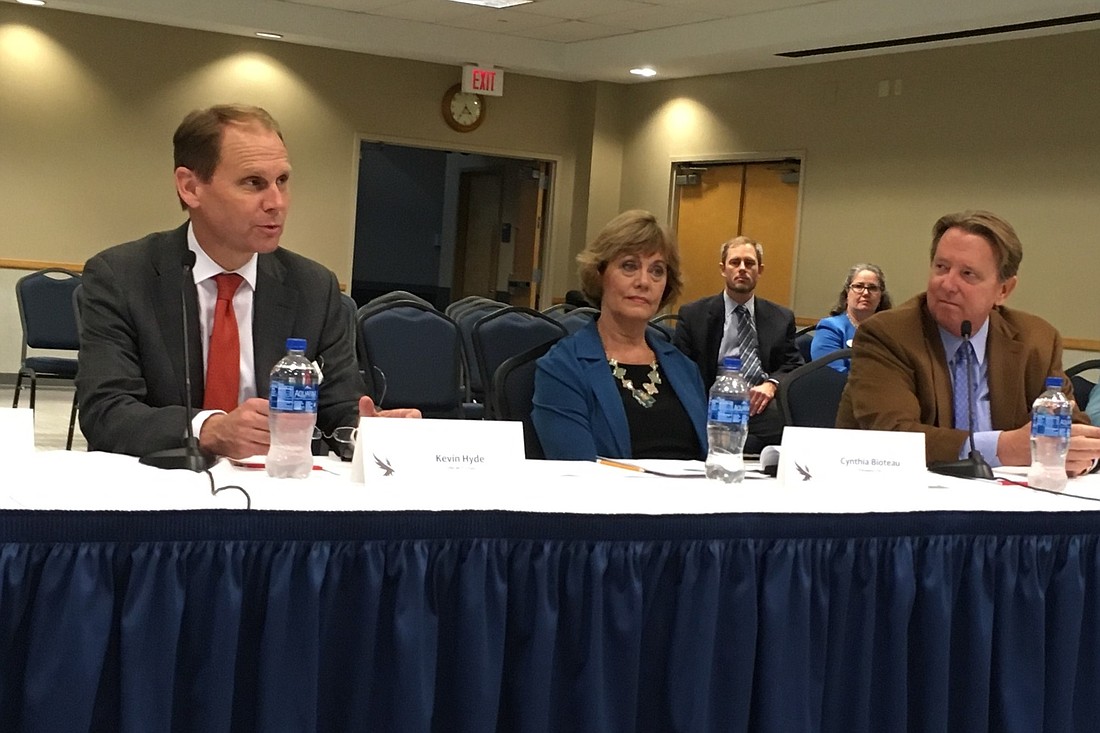
By Caren Burmeister
Contributing Writer
Collaboration between Florida State College at Jacksonville and the University of North Florida will boost economic development, expand enrollment and help more students earn degrees, the leaders of the schools say.
The schools have launched UNF Connect, a program to provide a seamless transition for students who start college at FSCJ and transfer to UNF for their bachelor’s degree.
The schools’ presidents and trustees met Thursday. It was the third meeting between the two boards.
Because of the “transfer pipeline,” about 61 percent of FSCJ’s transfer students enrolled at UNF, said Tom Serwatka, UNF’s vice president and chief of staff.
The Connect program also offers a reverse transfer option for students. Reverse transfer allows FSCJ students who have not completed their AA degrees to transfer to UNF. Once they complete the courses that FSCJ requires to award the AA degree, they can "reverse transfer" those credits to FSCJ and receive their AA degree from FSCJ while attending UNF.
FSCJ said 136 students have taken advantage of the reverse transfer program.
“It’s a particularly positive relationship we have,” said UNF President John Delaney, noting the State University System of Florida Board of Governors recognized the connection between UNF and FSCJ as the state’s best example of public university cooperation.
FSCJ President Cynthia Bioteau said she was grateful for the relationship with UNF.
“It’s a very engaged, constructive and productive relationship,” she said.
FSCJ serves more than 50,000 students a year, providing bachelor’s and associate degrees, technical certificates, workforce certification, adult and development programs, online degrees, GED preparation classes and more.
As of fall 2017, UNF enrolled 16,525 students.
UNF Connect academic advisers help FSCJ students choose prerequisites and reduce excess credit hours.
For a nominal fee, it also gives Connect students access to UNF’s wellness complex, library and student union.
Trustees from both schools are starting to explore collaborations on science, engineering and computing programs and building construction programs.
A program in sign language interpretation has already begun.
They also are discussing a UNF University Center in Nassau County, where students attending FSCJ’s campus in Yulee could transfer to earn their bachelor’s degree.
“That’s ongoing as we speak.” Bioteau said.
College degrees play a role in Jacksonville’s workforce and economic health, Serwatka said.
To become a major economic center, 35 to 40 percent of the city’s residents should have at least a bachelor’s degree, he said. That figure is now about 26 percent.
“Our two institutions are what’s going to drive it,” Delaney said.
To promote access, the Connect program makes its school orientation services available with evening and early morning appointments, whether in person, on the phone or online via Skype.
Bioteau said she appreciates UNF’s willingness to adapt, noting that most FSCJ students are in their mid-20s and usually juggle college courses with jobs and families.
Because of the collaboration, UNF is improving its graduation rates, building a more diverse student body and filling more of its student housing, Delaney said.
In addition, the two schools are building academic programs that complement, rather than compete, with each other.
“It’s very well integrated,” he said.
Delaney and Bioteau are retiring in May.
Delaney will be succeeded by David Szymanski, dean of the Carl H. Lindner College of Business at the University of Cincinnati.
Szymanski’s contract is being negotiated. When approved by UNF’s board of trustees, it will be presented to the State University System of Florida Board of Governors, which is scheduled to meet March 29 in Jacksonville.
UNF trustee Wilfredo Gonzalez cautioned colleges not to raise academic entrance standards too high, saying it can discourage students who question their ability to get a degree.
Gonzalez said he entered The City University of New York with a 2.7 grade-point average, but he said he was proud to graduate, magna cum laude, with a bachelor’s degree and later attend the John F. Kennedy School of Government at Harvard University.
“It’s not what you have coming in, it’s what you have going out,” said Gonzalez, the North Florida District director of the U. S. Small Business Administration.
“That’s why our collaboration is so critical,” said Bioteau, FSCJ’s president for four years. “We must be the access point and the connection.”
Until her replacement is found, Kevin Hyde, a partner at Foley & Lardner, will step in as interim president at FSCJ. An employment lawyer, Hyde has served two terms on the Jacksonville City Council and is the chair of UNF’s board of trustees.